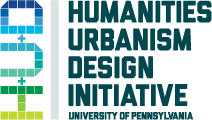H+U+D “Inclusive City” Colloquium Begins Year Three and Welcomes Six New Members—10.09.20
Since 2018, we have embarked on the new five-year Humanities, Urbanism, and Design (H+U+D) project, “The Inclusive City, Past, Present, and Future.” With the renewed $1.5 million Mellon grant, we are continuing to build on the foundation of the first project (2013-18) while focusing on the theme of inclusivity and diversity both in what we study and teach and in who we are. Fifteen faculty from departments across both the Weitzman School of Design and the School of Arts and Sciences were appointed to the Faculty Colloquium in 2018 and met bi-weekly for the last two years in a supportive and multi-disciplinary setting.H+U+D kicked off the third year of the “Inclusive City” Colloquium with a virtual Zoom meeting on September 11, 2020. This fall, we officially welcomed Andrea Goulet (French and Francophone Studies, School of Arts and Sciences) as one of the new co-directors of the H+U+D Initiative. The initiative also accepted six new faculty members into the colloquium from both humanities and design disciplines, who join several returning members. New members include: Brent Cebul (History, School of Arts and Sciences), Nancy Steinhardt (East Asian Languages and Civilizations, School of Arts and Sciences), Jorge Téllez (Romance Languages, School of Arts and Sciences), Randy Mason (Historic Preservation, Weitzman School of Design), Akira Drake Rodriguez (City and Regional Planning, Weitzman School of Design), and Domenic Vitiello (City and Regional Planning, Weitzman School of Design). For more information on the H+U+D Faculty Colloquium members, click here.
The new “Inclusive City” Colloquium faculty cohort is joined by two Junior Fellows, Dr. Tyeshia Redden and Dr. Syantani Chatterjee, as well as two Doctoral Dissertation Fellows, Rui Castro and Aaron Bartels-Swindells, who have been appointed for the 2020-21 academic year.
All of the Fall 2020 semester H+U+D Colloquium meetings will be held virtually because of the ongoing Covid-19 pandemic.















